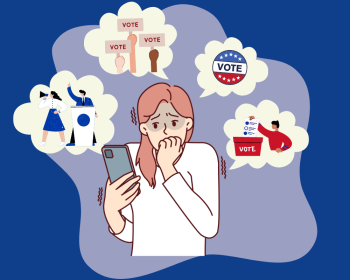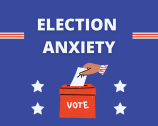Ask Yourself These 3 Questions to Manage the Roller Coaster of Election Anxiety
Ask Yourself These 3 Questions to Manage the Roller Coaster of Election Anxiety

When my now-teenage children were in elementary school, we would ask them 3 questions at dinner: 1) What was the best part of your day?, 2) What was your biggest challenge?, and 3) What did you contribute?
My children sometimes groaned, but the questions provided an entry for them to find language for both the easy and hard parts of their experiences and emotions, and see themselves as someone who had the opportunity, ability, and responsibility to make the world just a tiny bit better.
Those same questions can serve as a useful guide as we try to manage the high anxiety and general roller coaster of emotions that affect us during momentous election periods.
It is no surprise that many people feel anxious – we live at a time when ‘breaking news’ occurs multiple times a day, with horrific events like an assassination attempt and multiple threats of political violence, constant headlines that democracy is at stake, criminal trials, swinging polls in swing states, racist rhetoric, and extreme polarization that makes the ‘other side’ seem scary and malignant. At the same time, this election cycle has also filled many people with excitement and hope. It really is a rollercoaster, with the main constant being high levels of uncertainty.
So, how can the 3 questions I tortured my kids with at dinner help us manage --and even harness-- both the painful and the positive feelings in adaptive ways?
1) What was the best part of your day?
The meaning of this question will vary depending on your current emotional health. If your mental health is generally good, despite the periodic stress about the election and other upsetting world events, then the question is about what brings you moments of joy or contentment. If you are struggling with more chronic anxiety or sadness, finding joy is a tall order, so the question is more about what experiences provide a little relief or slight lessening of pain. The goal is to think about how you can make those kinds of experiences happen more often. This isn’t a suggestion to just pursue hedonism. Behavioral activation therapy emphasizes the importance of living your values and getting reinforcement from your activities; that can come from feeling good and having fun, but also comes from meeting your goals and being the person you want to be. The point is to calibrate your expectations about how good you are likely to feel given your broader circumstances and the events of the world, be a mini scientist to learn what leads to variations in your mood, and then be intentional about creating opportunities to find joy, relief, or meet your goals.
For most of us, that will mean having a good balance in our life, including some activities that allow us to get a break and have fun or relax, and some activities that help us feel productive and like we’re living in a way that is consistent with our values. During this time of uncertainty about the election, that may mean ensuring you are spending time with the people who support you, or distract you, or make you feel fulfilled, doing work that you find meaningful, or simply getting the relief of crossing a nagging item off your to-do list. It is likely to mean watching some ‘brain candy’ shows some days while going on long walks other days.
For some people, talking about politics and their anxiety helps them feel better, while for others it has the opposite effect. I’m usually a talker but my spouse is less so – the way he processes the craziness of this election cycle is to avidly watch (and occasionally participate in) prediction markets on the election where he finds satisfaction in monitoring the constantly changing odds for which candidate will win. I have other friends and family who take long breaks from the political news. There isn’t a right way to do it; you need to learn what works for you and recognize that what works for you one day might not work another day. My balance of fun/relaxing/active/productive/meaningful activity needs varies a lot by how tired I am, how stressed I feel about other aspects of my life, and the insanity of the current news cycle.
2) What was your biggest challenge?
This question helps us figure out when and why we’re struggling. Challenges aren’t bad but they require evaluation of what the situation demands, whether you have the resources to meet those demands and, if not, figuring out how else you get there. It may be that the biggest challenge tied to your election anxiety comes when you read the news or get stuck doomscrolling on social media. If so, then putting some boundaries on how often you check the news, how long you spend scrolling on your phone, or planning breaks when your phone is away may be really helpful. Alternatively, you can actively seek out more positive news online and shift your feed algorithm toward stories that uplift you, termed hopescrolling.
In other cases, the biggest challenge tied to your election anxiety may be indirect. For example, managing a difficult workload or tough relationship conversation is likely to be doubly challenging if you are sleep deprived because of your anxiety. In that case, managing your sleep may bring the most benefits. For still others, the biggest challenge is not tied to a negative news story or outcome, but the reality that we have no election outcome right now and won’t for quite a while. November feels simultaneously incredibly close and disturbingly far away! Tolerating the uncertainty is a huge challenge for many people, especially those vulnerable to anxiety. In that case, using strategies to manage the worry and catastrophic thinking often associated with uncertainty is key, including playing out how you would realistically cope with different outcomes and recognizing that not knowing does not mean a bad thing is going to happen.
3) What did you contribute?
It may seem counterintuitive to be asked how you will contribute given this article is about ways to manage your difficult emotions tied to the election, but some of the most powerful things we can do to feel better ourselves involve helping others and expressing gratitude. Moreover, taking action, rather than withdrawing, tends to be more effective at shifting our mood. If that action is tied to the election, this can also provide a sense of control and purpose because it counteracts the helplessness we often feel tied to big events. For me, that has meant donating and volunteering to text unregistered voters to support a candidate I care about. If taking more direct political action isn’t your thing, you can also take action in lots of other ways that are not so overtly political. For example, if you care a lot about immigration issues, you can reach out to one of the many organizations that support refugees and help with a clothing drive. If you’re passionate about health care, volunteer at a local hospital, or simply take cookies or flowers to a friend or neighbor who is ill. The list of possible ways to help is endless, and the rewards are enormous. We find meaning, live closer to our values, get out of our heads (and our bubble!), reduce the sense of helplessness and, of course, help others.
Keep in mind the goal is to manage (not eliminate) hard feelings and to harness your full range of feelings to make healthy choices that work for you. That will inevitably involve some trial and error. There is nothing wrong with feeling anxious about the election (or anything else); it is a natural and adaptive emotion that provides important communication when there are dangers in our environment, but you don’t want it to regularly make decisions for you that make your world smaller and sadder. Anxiety loves to be the loudest voice in the room, so just make sure you add other voices.
You can start by asking 3 simple questions at dinner tonight.
If you are struggling with more severe or chronic anxiety or depression, or you are dealing with other mental health challenges during this time, reach out for help. There are a lot of effective treatment options – ADAA.org is a good source to find a therapist in your region or telehealth option, and you can always call the National Suicide Prevention Lifeline at 988 or the Crisis Text Line (Text HOME to 741741).




















